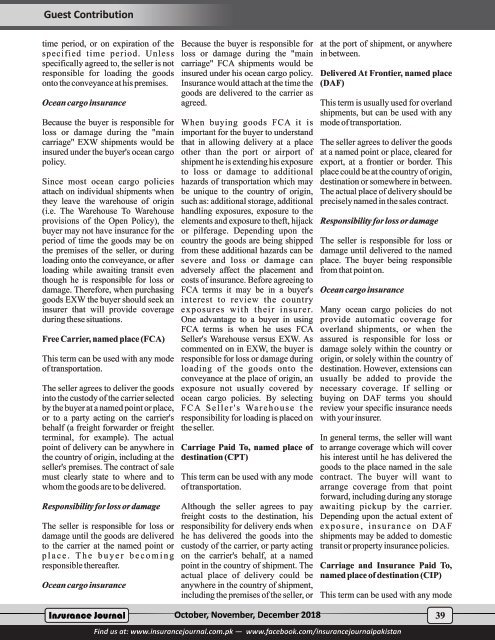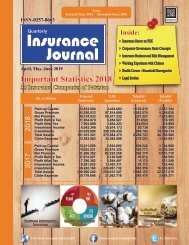Insurance Journal (4th Quarter 2018)
Create successful ePaper yourself
Turn your PDF publications into a flip-book with our unique Google optimized e-Paper software.
Guest Contribution<br />
time period, or on expiration of the<br />
specified time period. Unless<br />
specifically agreed to, the seller is not<br />
responsible for loading the goods<br />
onto the conveyance at his premises.<br />
Ocean cargo insurance<br />
Because the buyer is responsible for<br />
loss or damage during the "main<br />
carriage" EXW shipments would be<br />
insured under the buyer's ocean cargo<br />
policy.<br />
Since most ocean cargo policies<br />
attach on individual shipments when<br />
they leave the warehouse of origin<br />
(i.e. The Warehouse To Warehouse<br />
provisions of the Open Policy), the<br />
buyer may not have insurance for the<br />
period of time the goods may be on<br />
the premises of the seller, or during<br />
loading onto the conveyance, or after<br />
loading while awaiting transit even<br />
though he is responsible for loss or<br />
damage. Therefore, when purchasing<br />
goods EXW the buyer should seek an<br />
insurer that will provide coverage<br />
during these situations.<br />
Free Carrier, named place (FCA)<br />
This term can be used with any mode<br />
of transportation.<br />
The seller agrees to deliver the goods<br />
into the custody of the carrier selected<br />
by the buyer at a named point or place,<br />
or to a party acting on the carrier's<br />
behalf (a freight forwarder or freight<br />
terminal, for example). The actual<br />
point of delivery can be anywhere in<br />
the country of origin, including at the<br />
seller's premises. The contract of sale<br />
must clearly state to where and to<br />
whom the goods are to be delivered.<br />
Responsibility for loss or damage<br />
The seller is responsible for loss or<br />
damage until the goods are delivered<br />
to the carrier at the named point or<br />
p l a c e . T h e b u y e r b e c o m i n g<br />
responsible thereafter.<br />
Ocean cargo insurance<br />
Because the buyer is responsible for<br />
loss or damage during the "main<br />
carriage" FCA shipments would be<br />
insured under his ocean cargo policy.<br />
<strong>Insurance</strong> would attach at the time the<br />
goods are delivered to the carrier as<br />
agreed.<br />
When buying goods FCA it is<br />
important for the buyer to understand<br />
that in allowing delivery at a place<br />
other than the port or airport of<br />
shipment he is extending his exposure<br />
to loss or damage to additional<br />
hazards of transportation which may<br />
be unique to the country of origin,<br />
such as: additional storage, additional<br />
handling exposures, exposure to the<br />
elements and exposure to theft, hijack<br />
or pilferage. Depending upon the<br />
country the goods are being shipped<br />
from these additional hazards can be<br />
severe and loss or damage can<br />
adversely affect the placement and<br />
costs of insurance. Before agreeing to<br />
FCA terms it may be in a buyer's<br />
interest to review the country<br />
exposures with their insurer.<br />
One advantage to a buyer in using<br />
FCA terms is when he uses FCA<br />
Seller's Warehouse versus EXW. As<br />
commented on in EXW, the buyer is<br />
responsible for loss or damage during<br />
loading of the goods onto the<br />
conveyance at the place of origin, an<br />
exposure not usually covered by<br />
ocean cargo policies. By selecting<br />
F C A S e l l e r ' s Wa r e h o u s e t h e<br />
responsibility for loading is placed on<br />
the seller.<br />
Carriage Paid To, named place of<br />
destination (CPT)<br />
This term can be used with any mode<br />
of transportation.<br />
Although the seller agrees to pay<br />
freight costs to the destination, his<br />
responsibility for delivery ends when<br />
he has delivered the goods into the<br />
custody of the carrier, or party acting<br />
on the carrier's behalf, at a named<br />
point in the country of shipment. The<br />
actual place of delivery could be<br />
anywhere in the country of shipment,<br />
including the premises of the seller, or<br />
at the port of shipment, or anywhere<br />
in between.<br />
Delivered At Frontier, named place<br />
(DAF)<br />
This term is usually used for overland<br />
shipments, but can be used with any<br />
mode of transportation.<br />
The seller agrees to deliver the goods<br />
at a named point or place, cleared for<br />
export, at a frontier or border. This<br />
place could be at the country of origin,<br />
destination or somewhere in between.<br />
The actual place of delivery should be<br />
precisely named in the sales contract.<br />
Responsibility for loss or damage<br />
The seller is responsible for loss or<br />
damage until delivered to the named<br />
place. The buyer being responsible<br />
from that point on.<br />
Ocean cargo insurance<br />
Many ocean cargo policies do not<br />
provide automatic coverage for<br />
overland shipments, or when the<br />
assured is responsible for loss or<br />
damage solely within the country or<br />
origin, or solely within the country of<br />
destination. However, extensions can<br />
usually be added to provide the<br />
necessary coverage. If selling or<br />
buying on DAF terms you should<br />
review your specific insurance needs<br />
with your insurer.<br />
In general terms, the seller will want<br />
to arrange coverage which will cover<br />
his interest until he has delivered the<br />
goods to the place named in the sale<br />
contract. The buyer will want to<br />
arrange coverage from that point<br />
forward, including during any storage<br />
awaiting pickup by the carrier.<br />
Depending upon the actual extent of<br />
exposure, insurance on DAF<br />
shipments may be added to domestic<br />
transit or property insurance policies.<br />
Carriage and <strong>Insurance</strong> Paid To,<br />
named place of destination (CIP)<br />
This term can be used with any mode<br />
<strong>Insurance</strong> <strong>Journal</strong> October, November, December <strong>2018</strong><br />
39<br />
Find us at: www.insurancejournal.com.pk — www.facebook.com/insurancejournalpakistan

















